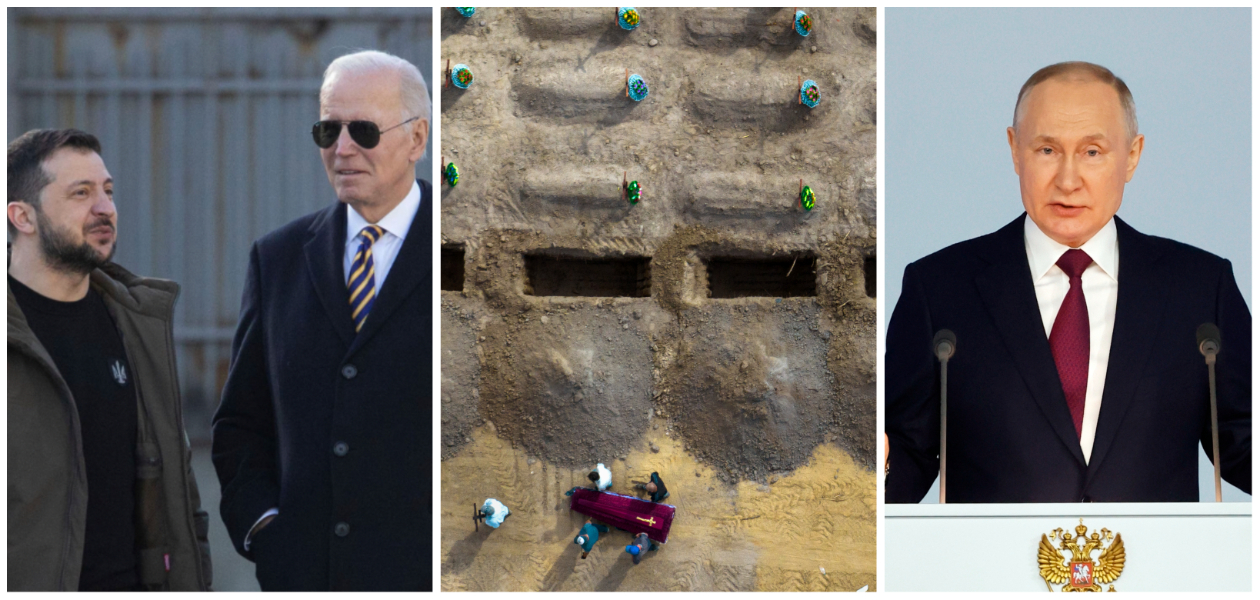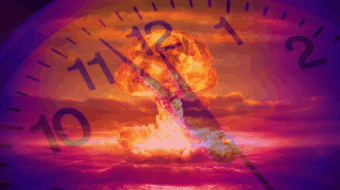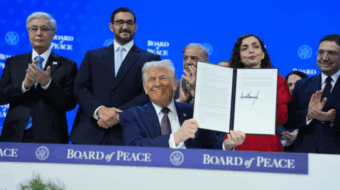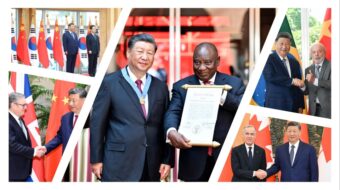
Most of the corporate media hailed President Joe Biden’s surprise visit to Kiev this past weekend where he met Ukrainian leader Volodymyr Zelensky. Russia, which the administration has said cannot be trusted with nuclear weapons or diplomatic negotiations, was told ahead of time, apparently, and was trusted by the U.S. to insure nothing happened to Biden during the long train ride from the Polish-Ukrainian border to Kiev.
The chances the visit could result in improved prospects for peace were dampened, however, even before the trip—partially because the U.S., the largest supplier of weapons to Ukraine and the largest supplier of weapons all around the world, had ramped up rhetoric against China by accusing it of planning to sell arms to Russia. It’s worth remembering that the U.S. has a military budget 15 times the size of Russia’s military budget.
Visiting just before the first anniversary of the Russian invasion of Ukraine, Biden labeled the conflict “a brutal and unjust war.” There can be little argument about the brutality of Russia’s actions in the war, nor can there be argument with the proposition that even decades of provocations by NATO and the U.S. don’t give Russia a blank check to do whatever it wishes in Ukraine.
A presidential visit to Ukraine, however, was not needed if the point was simply to condemn the brutality of the war. A visit on that level, one would think, should serve the cause of peace, and this visit did not do that.
A year after the invasion, Biden declared: “Kiev stands. And Ukraine stands. Democracy stands. The Americans stand with you, and the world stands with you.”
As soon as he left the “democracy” of Ukraine, he headed back to Poland, which he also praised as a key part of a world movement for democracy and against autocracy. Biden, of course, must notice that Poland is run by fascists who have tossed out some of the last semblances of democracy in that country.
The Republican state governments in places like Texas or Florida could take lessons from Polish authorities on what to do with the rights of women, minorities, and LGBTQ people—lessons on how to trash all of those rights. Poland also provides some of the best examples of how to crush unions and freedom of the press.
Shockingly, or maybe not so shockingly, some MSNBC pundits chimed in Tuesday morning with their assessments that Poland is replacing Germany as the main NATO and EU champion of “democracy.”
It almost seemed at times over the weekend that a major purpose behind Biden’s visit to Kiev was to pressure U.S. allies to maintain their unconditional support for the war the U.S. is engaged in with Russia by way of Ukraine. There was likely concern in the Biden administration that some of the U.S. allies may have been almost pleased about China saying it had suggestions for halting the fighting in Ukraine.
Many of these allies of the U.S., as they did with Russia before the imposition of the sanctions against that country, want to maintain good relations with China. They do a lot of business with China and could benefit from doing even more.
Ukraine today, Taiwan tomorrow?
China said last weekend it is on the verge of unveiling a peace initiative regarding Ukraine. The U.S. reaction has not been good. Almost immediately, Secretary of State Antony Blinken declared that negotiations now, as proposed by China, would not be good because Russia would use them to cement an advantage in Ukraine. In other words, forget peace, and let’s make more war.

Also lessening the possibility of any ceasefire or negotiations any time soon, Biden announced in Kiev that the U.S. was going to provide an extra $500 million worth of military assistance—on top of the more than $50 billion already spent.
And though the White House continues to insist the U.S. is not at war with Russia, the Pentagon is set to pay the major arms producers in the U.S. to increase ammunition production to the highest level in decades. Germany and other U.S. allies had hoped to purchase ammunition from Brazil, not usually known for the fact that it has long been one of the world’s biggest producers of ammunition.
That has been cut off now because Brazil’s President Lula has announced that his country is for peace and will not supply arms or ammunition to be used in Ukraine. It leaves the U.S. as the unquestioned kingpin of armaments shipments and makes truly hypocritical the warnings to China this weekend by the U.S. about providing any weapons or equipment to Russia.
Blinken boasted how he had warned top Chinese diplomat Wang Yi at the Munich security conference that it would be a serious problem after alleged “intelligence reports” suggested China was planning to provide arms and ammunition to Russia.
But Chinese Foreign Ministry spokesman Wang Wenbin dismissed Blinken’s warnings, saying, “We do not accept the United States finger-pointing on China-Russian relations, let alone coercion and pressure.” He repeated that China wants to play a role in ending the conflict between Kiev and Moscow.
The Chinese position for months has been that the war in Ukraine can spin out of control into a larger worldwide conflict. Already, all three of the biggest world powers—the U.S., Russia, and China—are involved, along with much of Europe, Japan, South Africa, Iran, and others feeling pressured to pick sides.
China, along with Brazil, Cuba, and others, is continuing, however, to urge a ceasefire and peace talks.
A Chinese statement urges the U.S. to stop pouring weapons into the conflict and to end the war hysteria the U.S. is building up over Taiwan.
“We urge relevant countries to immediately stop adding fuel to the fire, stop shifting the blame to China, and stop hyping up the discourse of ‘Ukraine today, Taiwan tomorrow,’” the statement from Wang Wenbin declared. The remarks were a reference to repeated U.S. claims recently that China is preparing to attack Taiwan.
“We will continue to promote peace talks, provide Chinese wisdom for the political settlement of the Ukraine crisis, and work with the international community to promote dialogue and consultation to address the concerns of all parties and seek common security,” the Chinese statement said.
Wang Yi, who was on the receiving end of Blinken’s threats in Munich, arrived in Moscow Tuesday ahead of a meeting with Russian President Vladimir Putin and other senior officials. Kremlin spokesman Dmitry Peskov hailed Russia-China ties as “multidimensional and allied in nature.”
The visit to Moscow comes as China’s Foreign Ministry issued a document Tuesday it characterized as President Xi Jinping’s “global security initiative.”
The aim of the initiative is to “eliminate the root causes of international conflicts, improve global security governance, encourage joint international efforts to bring more stability and certainty to a volatile and changing era, and promote durable peace and development in the world.”
The statement said that the initiative would also “support political settlement of hotspot issues, such as the Ukraine crisis through dialogue and negotiation.”
Nuclear reversal
Underlining how the Biden administration’s actions last weekend harmed the quest for peace, Russia’s President Vladimir Putin, unfortunately, added to the problem by suspending Moscow’s participation in the last nuclear arms control pact with the U.S.
During his State of the Nation address, Putin said, “I am forced to announce today that Russia is suspending participation in the strategic offensive arms treaty.”
The New START treaty, signed by the U.S. and Russia in 2010, called for the number of strategic nuclear missile launchers to be cut in half. Putin said Russia must stand ready to resume nuclear weapons tests if the U.S. does so. Corporate media outlets left that “if the U.S. does so” proviso out of many of their reports.
Putin said that the U.S. and NATO have stated their objective is to strategically defeat Russia. Under those circumstances, he declared it would be “totally absurd” to allow the West to inspect Russian-controlled nuclear facilities, which the new START Treaty requires.
Putin also accused Western leaders of having discussed the supply of nuclear weapons to Ukraine before the Russian invasion, which he continued to refer to as a “special military operation.”
He said NATO had set up military bases on Russia’s borders. Of the U.S. he said, “No other country in the world has as many foreign military bases. They have hundreds of military bases around the world; the whole planet is dotted with their bases.”

Peace at a stalemate
Shortly after Putin’s speech, Biden spoke in Warsaw. He declared: “A year ago, the world was bracing for the fall of Kiev, which stands tall, proud, and most importantly free.”
He said the “whole world was tested in response to the war with Russia [his words, describing the war as a war with Russia], and the world did not look the other way. Putin thought NATO would fracture and divide. Instead, NATO is more united and more unified than ever before.”
Putin was “confronted today,” Biden said “with something he didn’t think was possible a year ago…. the democracy of the world has grown stronger, not weaker. But the autocrats of the world have grown weaker, not stronger because in moments of great upheaval and uncertainty, knowing where you stand is most important. Ukraine will never be a victory for Russia.”
Biden topped those remarks with an announcement that the U.S. is ready to impose yet more sanctions on Russia this week, declaring, “We will hold accountable those responsible for this war.”
As the two leaders spoke, Putin in Moscow and Biden in Warsaw, the situation on the battlefield in Ukraine was clearly at a stalemate.
That stalemate, combined with the speeches of the two leaders, leaves little hope for peace any time soon. The people and the peace movements of the world are needed to step in, now more than ever.
As with all op-eds published by People’s World, this article reflects the opinions of its authors.
People’s World has an enormous challenge ahead of it—to raise $200,000 from readers and supporters in 2023, including $125,000 during the Fund Drive, which runs from Feb. 1 to May 1.
Please donate to help People’s World reach our $200,000 goal. We appreciate whatever you can donate: $5, $10, $25, $50, $100, or more.












